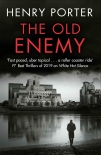The Old Enemy, Henry Porter [important of reading books txt] 📗

- Author: Henry Porter
Book online «The Old Enemy, Henry Porter [important of reading books txt] 📗». Author Henry Porter
Robert Harland
The spy’s spy and hero of the Cold War
Born into a Scottish family with a history of colonial adventure, particularly on his mother’s side, Robert Harland seemed destined to find a role for himself in MI6, the British Secret Intelligence Service, and to become one of its key operatives in the final decade of the Cold War. Many of his exploits remain subject to the Official Secrets Act because the ideas and tradecraft he developed are still used by a younger generation of spies today, but what is known of his career amply confirms Harland’s reputation as the ‘Spy’s spy’.
Although bright and athletic, Harland was not a success at school and was twice expelled for flouting regulations and for youthful pranks. His mother died when he was sixteen and his father, with whom Harland had a distant relationship, despaired of his son and put him to work on a local farm in Argyll. The tough life of a hill farmer suited the young man, but Harland made arrangements on his own to prepare for and sit the Oxbridge entrance exams. He went up to Oxford to study modern languages, where he gained a hockey blue and was spotted by MI6. After coming down he joined the army and the Black Watch. He was stationed in Germany and later in Northern Ireland, where he saw first hand what he regarded as the inept and brutal treatment of Catholics at the beginning of the Troubles. He held a lifelong belief that the North and South of Ireland should be united.
He joined MI6 in 1976 and after a routine posting to an embassy – in his case, New Delhi – he was sent to Berlin Station, then housed in the city’s old Olympic Stadium. Harland’s exceptional linguistic skill and attuned ear came into play: he was capable not only of speaking a language idiomatically but shifting from one regional accent to another, a talent that proved a great advantage when operating behind the Iron Curtain. He soon showed himself to be one of the more resourceful operatives, and by 1980 was running the Green Glass network across three Warsaw Pact countries.
The Green Glass network was based on the agricultural salesmen and suppliers who travelled extensively in the Warsaw Pact countries and had frequent contact with the West because of the Communists’ desperate need for foreign currency. When the Stasi uncovered the GDR part of the network three years later, it was felt that Harland had nothing more to offer in that particular theatre of the Cold War, and he moved to take up postings in Ankara and Cairo, neither of which he enjoyed as much as Berlin. By the end of the 1980s, however, he was back in Europe, preparing for one of the great intelligence operations of the era – extracting the Stasi-sponsored Arab terrorist Abu Jemal from a safe house in Leipzig, where the terrorist enjoyed the company of mistresses laid on by the GDR. The planning and execution were all Harland’s, and on the night the Wall came down he was responsible for springing his agent Kafka from the Stasi interrogation centre in Hohenschönhausen and, after a dash across East Berlin, he, Kafka and a double agent named Rudi Rosenharte reached the Wall at the moment it became possible to cross to the West without papers.
He always said that luck and good timing were as important as preparation and tradecraft, although he excelled at both. In Turkey, he happened upon the lynchpin figure – a Russian pilot – in the plot to flood Western Europe and America with Afghani heroin. In Egypt he was responsible for identifying key Libyan agents supplying arms to Western terrorists, as well as the man providing mortars and anti-personnel mines to civil wars across the continent, who also happened to be Russian.
A good-looking man with a commanding presence, Robert Harland was also famously taciturn, and he did not suffer fools, particularly in the upper echelons of SIS. But he could wear a suit and tie with the best of them. In New York, he worked undercover in the UK mission to the UN and was an impressive and convincing figure. Yet even there he could not escape drama and was one of the few passengers to survive an air crash at La Guardia.
Harland suffered for his country, at one stage being held and tortured by the feared Czechoslovak State Security, the StB. He never spoke of this ordeal and refused all honours. It is believed that he became disenchanted with MI6 and with his own country, especially after Brexit, which he deplored. Having helped the Estonians establish an intelligence service to defend the country against the Russian threat, he took out Estonian citizenship and made a new life with his wife, Ulrike, in Tallinn.
He leaves his wife, Ulrike, and a stepson – the German filmmaker Rudi Rosenharte, the son of his wife’s first husband and the man who Harland rescued from East Berlin.
Forty miles out from Zeebrugge, the wind swung round to the east and increased. Samson went up on deck. Gus, who had been taking regular pulls from a flask for most of the voyage, darted a black look at Fleur, handed over to her and went to sleep it off below. There were still five hours to port. Fleur amused herself by showing Samson the basics of sailing, teaching him to keep his eye on the luff of the sail, in the angle between the mast and the boom, as they steered as





Comments (0)